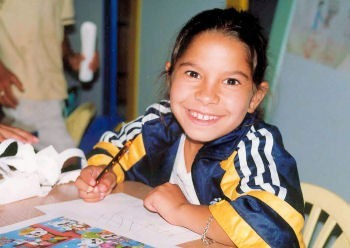Child Sponsorship background from Skopje, Macedonia
 SOS Children's Village Skopje
SOS Children's Village Skopje
The SOS Children's Village in Skopje was built on a site covering 12,600 m² on the outskirts of the town; the local schools and nursery are within walking distance. On 29 April 2005 in the presence of over 400 friends, neighbours, government official, ambassadors and sponsors, the first Macedonian SOS Children's Village in Skopje was officially opened by the country's President at the time, Branko Crvenkovski, and the President of SOS Children's Villages.
SOS Children's Village Skopje comprises twelve family houses, houses for the village director and the SOS aunts (who support the SOS mothers and take care of the children when the mothers are on leave), a multipurpose hall and an administration and service area. In the park of the SOS Children's Village, a vast playground was laid out, where the children from the neighbourhood join the children from the SOS Children's Village to play and have fun together. The twelve family houses are large enough to give a new home to up to 84 children.
Other SOS Projects in Skopje
The Family Strengthening Programme offers access to essential services for children’s development (eg. educational, nutritional and health support, social skills) and supports families to protect and care for their children. The programme also aims at linking families with income generating activities and offers help to improve the parents’ parenting skills.
Background to Skopje
Skopje is the capital city of the Former Yugoslav Republic of Macedonia (FYROM) and is located in the Vardar valley which links the Balkan riparian states of the Danube river to the Aegean Sea. Until the end of the 19th century, Skopje was part of the Ottoman Empire. After 1888, the city experienced a boom due to the opening of the rail connection between Belgrade and Saloniki. After the end of World War I, Skopje came under Serbian influence and in 1963, many of the architectural monuments that were evidence of the city's past under Turkish rule (mosques, Turkish baths) were destroyed by an earthquake which laid about 50% of Skopje in ruins. Today, Skopje is Macedonia's most important industrial centre.

 Return to Schools Wikipedia Home page…
Return to Schools Wikipedia Home page…
